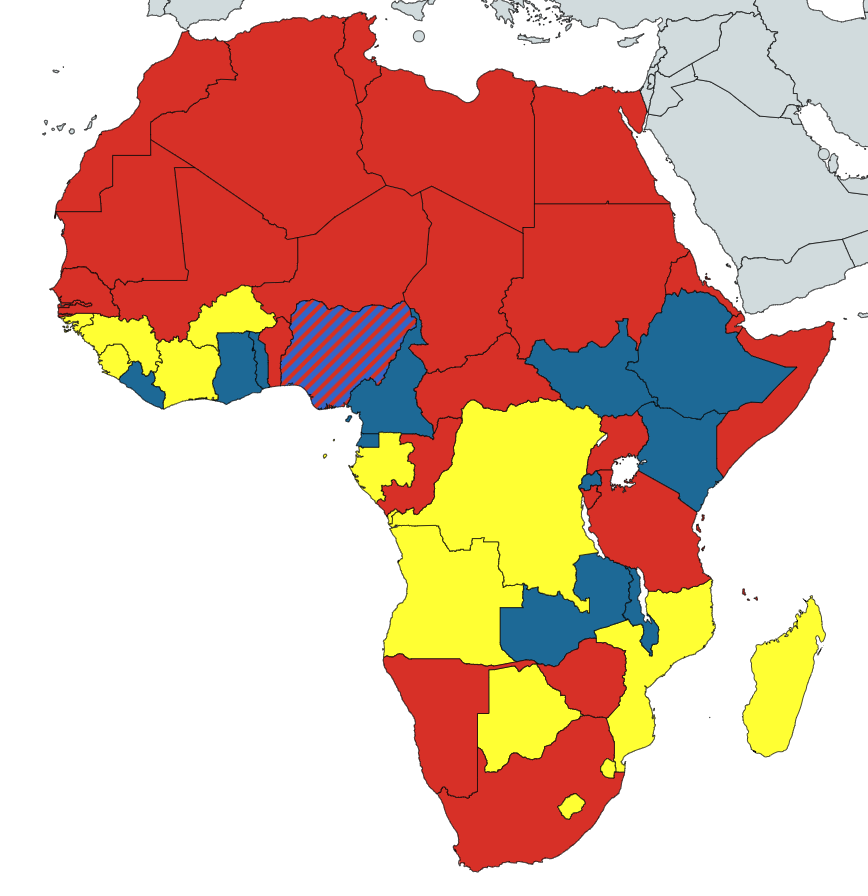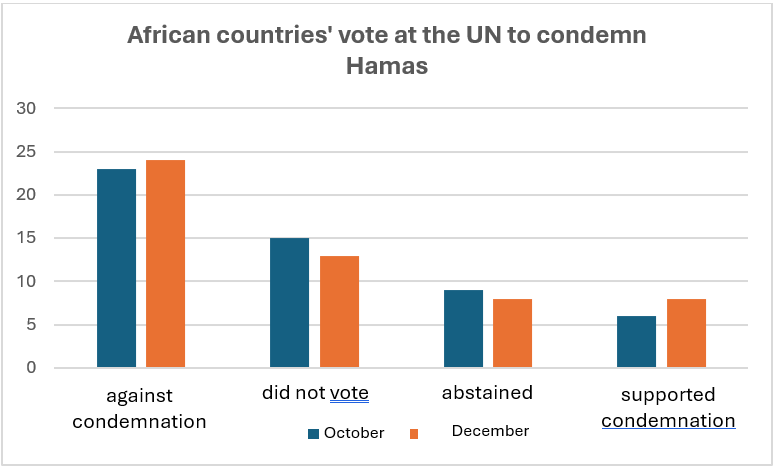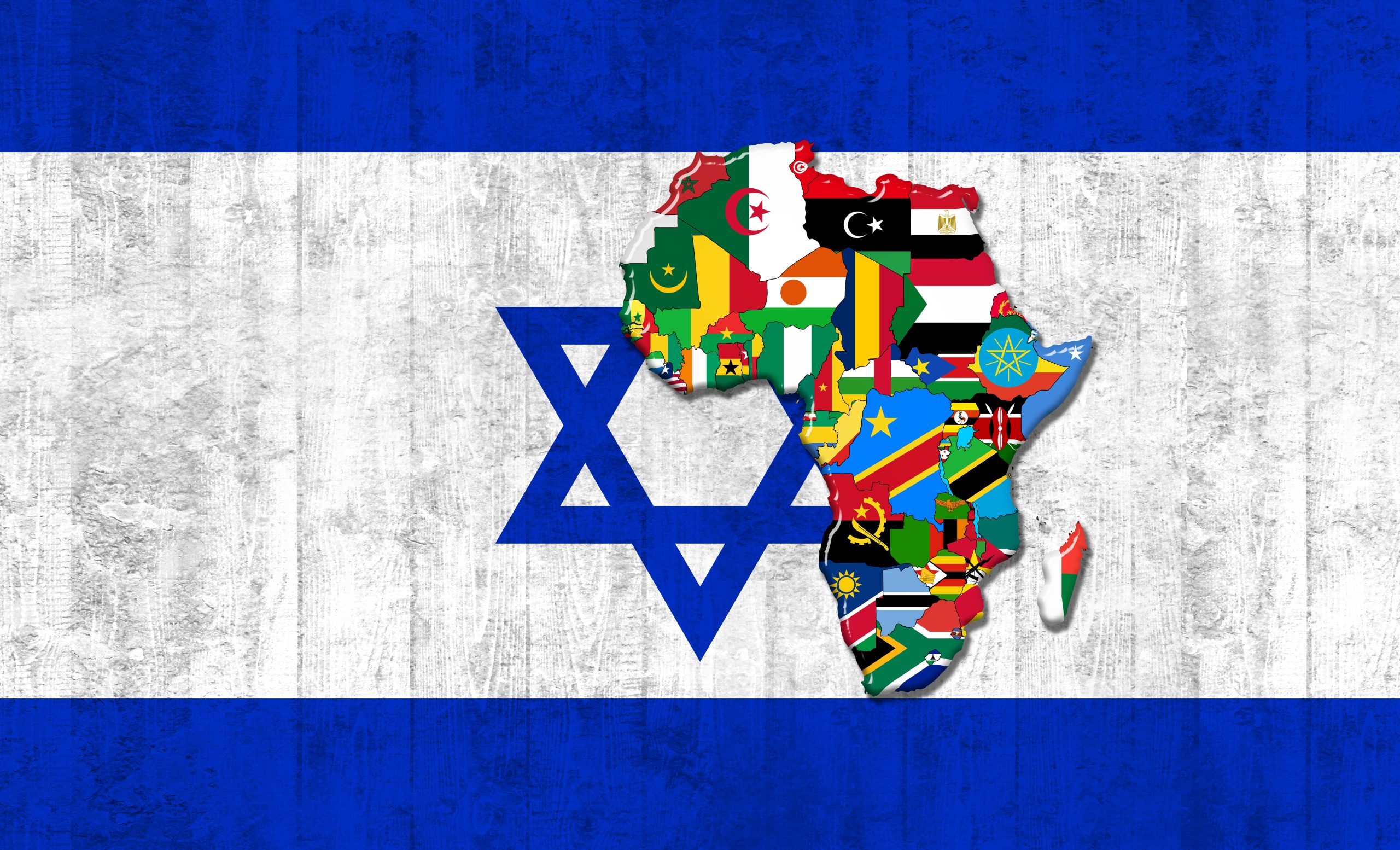Strategic Assessment
The responses of African countries to the Hamas attack and the war in Gaza shed light on Israel’s strengths and weaknesses on the African continent. Analyzing the characteristics of their responses shows that it is both plausible and beneficial for Israel to strengthen its alliances with certain countries in Africa. Stepping up Israel’s diplomatic efforts on the continent in the short and long term could be useful in aiding security concerns (primarily around the Red Sea), preserving and extending the accomplishments of the Abraham Accords, and improving the balance of African votes at the UN in Israel’s favor.
Keywords: foreign policy, Africa, Swords of Iron, UN, Red Sea, legitimacy, South Africa, Abraham Accords
Voting patterns by African countries at the UN about the Gaza War (calls for a ceasefire and proposed amendments condemning Hamas)

Legend: Red – Countries that have consistently voted against Israeli interests | Yellow – Countries that voted for a ceasefire, but signaled some degree of balance (abstention or absence in votes on condemning Hamas) | Blue – Countries that voted in favor of Israel at least once | Blue with red stripes – Nigeria, which changed from supporting the condemnation of Hamas to opposing it
In recent decades, Israel has devoted strenuous diplomatic efforts to forming and upgrading relations with various African countries. The diplomatic history of relations between Israel and Africa is dramatic. In the 1960s, Golda Meir, then Israeli foreign minister (and later prime minister), orchestrated a stormy “honeymoon” in these relations. This was followed by a period of deteriorating relations following the Yom Kippur War in 1973, when Israel was almost totally expelled from Africa. In the 1980s, African countries began gradually restoring their relations with Israel. During the recent governments of Prime Minister Benjamin Netanyahu, these relations have undergone another renaissance. Netanyahu has visited Africa five times (more than any other Israeli prime minister); Israel has opened a number of new embassies and economic offices on the continent; and since 2016, Israel has established or renewed relations with a number of Muslim countries in Africa: Guinea in 2016, Chad in 2019, and Morocco and Sudan in 2020. For a short time, Israel also managed to recover its observer status at the Organization of African Unity (OAU), before being expelled from the organization in the past year under pressure from South Africa and Algeria.
Since the 1970s, however, many countries in Africa have adopted a pro-Palestinian line in international forums and have also recognized Palestine as an independent state. Although they softened this pro-Palestinian position in many cases, it persisted even after renewing relations with Israel. Most African countries realized that they could simultaneously issue pro-Palestinian statements and maintain proper bilateral relations with Israel. This dual approach complicated attempts by politicians, diplomats, and scholars to assess the effectiveness of Israel’s recent efforts to forge alliances in Africa. Has Israel developed genuine alliances with African countries? Will these countries abandon Israel during a large-scale regional crisis, as has happened in the past?
The Hamas attack on October 7, 2023 and the subsequent Swords of Iron war therefore constitute an important test case for Israel’s standing in Africa. The intensity of the events sheds new light on the nuances involved in Israel’s position on the continent, highlighting which of Israel’s African alliances are more solid than others. Additionally, it underscores the impact of other broad currents in Africa, such as religiosity, terrorism, and great power rivalry, on Israel’s position there.
African Countries in the Wake of the Hamas Attack and the Swords of Iron War
African countries reacted in different ways to the Hamas attack on October 7 and the War in Gaza. In the days following Hamas’s attack, a number of African countries condemned the atrocities, among them were Kenya, Ghana, Togo, Cameroon, Zambia, and the Democratic Republic of the Congo.
In contrast, South Africa and Arab countries in North Africa blamed Israel for the escalation. South Africa stood out as the leading non-Muslim African country most hostile to Israel. Aside from Chad, it was the only African country to recall its diplomatic representatives from Israel, and the South African Parliament passed a resolution calling on the government to completely sever its ties with Israel. In December, South Africa demanded that the International Court of Justice (ICJ) in The Hague investigate Israel for war crimes and genocide in Gaza. Yet, despite South Africa’s exceptional measures since the outbreak of war, its attitude also reveals a desire for maintaining a balance between its vigorous pro-Palestinian denunciation of Israel—motivated by its leaders’ declared “liberation ideology”—and its government’s apparent interest to avoid completely severing relations with Israel, with which Pretoria has non-negligible economic ties.
Most African countries, including a number of countries that have good bilateral relations with Israel (such as Uganda and Angola), have either employed ambiguous and neutral language in statements or have completely ignored the war. Tanzania, two of whose citizens were murdered by Hamas, delegated a senior diplomatic representative to attend a ceremony in Israel in December in commemoration of one of these victims, but it has officially adhered to a vague call for a de-escalation, humanitarian aid for Gaza, and continuation of the peace process in line with the two-state principle. The government of Uganda distanced itself from the pro-Israeli ruling of the Ugandan judge, Julia Sebutinde, at the ICJ. As time has passed and the war has continued, a number of countries who initially condemned Hamas have since issued vague general statements about peaceful solutions.
The litmus test of Israel’s standing in Africa during the war was the UN votes on October 27 and December 12. The resolutions adopted on these dates called for an immediate ceasefire and did not condemn Hamas, and, thus, Israel and its close allies opposed them. These resolutions won substantial support in Africa, and even countries friendly to Israel, such as Kenya and Ghana, voted for them. At the same time, a few African countries stood by Israel. Liberia voted against the December 12 resolution, while Cameroon, South Sudan, Malawi, Cabo Verde, Equatorial Guinea, and Togo abstained on both votes. Ethiopia and Zambia abstained on the first vote but supported the later resolution.
These two votes were accompanied by votes on Western-sponsored amendments that condemned Hamas. These votes have special value in evaluating Israel’s standing in Africa, and the results of these votes were more favorable to Israel. In the vote on October 27, six countries (Ghana, Kenya, Nigeria, Malawi, Cabo Verde, and South Sudan) voted in favor of the amendment condemning Hamas, nine countries (among them Angola and Ivory Coast) abstained, and 15 countries cast no vote on the amendment. The results on the amendment condemning Hamas on December 12 were slightly better for Israel. Eight countries supported the condemnatory amendment, including three that had abstained or had not voted on the October 27 amendment: Rwanda, Ethiopia, and Liberia. Guinea, which had voted against the October 27 amendment, abstained on the December 12 amendment. Nigeria changed its October 27 support for condemning Hamas to opposing the amendment on December 12. Although a majority of the UN General Assembly supported both the amendments condemning Hamas, in both cases the majority was a few votes short of the two-thirds needed to pass the amendments in the General Assembly. In this case, African countries close to Israel, such as Cameroon and Zambia, which did not vote at all, could have tipped the scales in favor of Israel.

Israel’s Ambiguous Standing in Africa
The responses of the African countries to the war illustrate the great discrepancy in Israel’s standing in various parts of the continent. Many aspects are at play here. The prevalent religiosity in each country, the local histories of Israel’s image, and each government’s international orientation and security challenges all shape Israel’s current position.
First, Israel’s standing is relatively weak in most of the Muslim African countries. The nine African countries that do not have any diplomatic relations with Israel are all Muslim countries in North Africa, the Sahel, and the Horn of Africa. The Muslim aspect affects not only the African countries that are members of the Arab League (from Mauritania through Djibouti) but also countries with substantial non-Arab Muslim populations that were formerly considered “moderate” in their attitude to Israel, such as Senegal and Nigeria, where there have been instances of popular unrest in protest against the war in Gaza.
Second, Israel’s standing is weak in the southern part of the continent, where politicians and large parts of the population remember Israel’s cooperation with their white oppressors in the 1970s and 1980s, and where the Palestinian cause enjoys relatively broad support. In recent decades, South Africa has been one of the most critical voices against Israel in Africa. The South African government’s anti-Israeli stance stems from a feeling of historical and cultural solidarity with the Palestinians, accompanied by deep anti-Zionist feelings. In recent years, the South African criticism has been increasingly expressed through support for Hamas in the latter’s conflicts with Israel. South Africa downgraded its representation in Israel even before the current war; the governing party in the country has expressed support for the Boycott, Divestment, and Sanctions (BDS) movement; and the South African government led a successful campaign to deprive Israel of its observer status at the OAU. 2024 is also an election year in South Africa, and there are indications that for the first time, the ruling African National Congress party is likely to lose the absolute majority it has enjoyed in Parliament since the apartheid regime came to an end. An aggressive attitude toward Israel therefore also serves the ruling party in its competition with its political rivals, some of which are even more hostile to Israel. In addition to South Africa, Namibia has also voiced anti-Israel views and has expressed support for South Africa’s campaign at the International Court of Justice at The Hague to have Israel tried for genocide.
Furthermore, the weakening of American influence in Africa vis-à-vis both China and Russia in recent years has negatively affected the ability of the United States to gain support from African countries for Western interests around the world, such as the war in Ukraine and the war against Hamas. Countries that have become close to Moscow in recent years, such as the Central African Republic, have also tended to adjust their UN votes to reflect Russia’s views. A comparison between how the African countries have voted at the UN on the war in Ukraine and their votes on the Israel–Hamas war show some degree of correlation (albeit not absolute) between them, as well as conspicuous overlap between the countries that refrained from condemning Russia and those that refrained from condemning Hamas.
Conversely, Israel has good relations with Christian-majority countries in Eastern, Central, and Western Africa. Israel also benefits from broad popular support in those countries, which is also supported by the Christian Evangelical religious revival there (especially the Pentecostal movement), which has expanded in recent decades. This is especially true for countries that also face Islamist terrorism (whether Sunni Jihadi terrorism or terrorism linked to Iran and Hezbollah). Kenya, which is being challenged by Sunni Islamists from Somalia and has also been affected by the attacks of the Houthis in the Red Sea, is a prime example of this, as are South Sudan and the Christian population in southern Nigeria. A survey conducted in 2007 by the Pew Research Center in a number of African countries shows that the publics in Ivory Coast, Kenya, Uganda, Ethiopia, and Ghana tend to be more sympathetic to Israel in the conflict with the Palestinians, while in Senegal, Mali, Tanzania, and Nigeria, which have Muslim majorities, sympathy for the Palestinians is much greater. South Africa, despite its official hostility toward Israel, has a considerable African Christian population that is supportive of Israel, particularly among members of the Evangelical faith.
It should be emphasized that most African countries, including those severely critical of Israel, such as South Africa, are still following a dual policy that includes having both extensive bilateral ties with Israel and expressing criticism or neutrality toward it through voting on the Palestinian issue in international forums. As of the writing of this article, not a single African country—including the Muslim countries that have recently established relations with Israel, such as Chad, Sudan, Guinea, and Morocco—has officially severed its relations with Israel. From a historical perspective, this alone is an Israeli achievement; as noted, during the Yom Kippur War and in its aftermath, more than 20 African countries broke off diplomatic relations with Israel (then it was a result of a combination of Arab pressure and disappointment with the benefit of their relations with Israel). This act led to the almost complete expulsion of Israel from the continent, a development that is recalled as one of the biggest catastrophes in the history of Israel’s foreign relations. Breaking off relations by African countries around events related to the Israeli–Palestinian conflict also happened in the first decade of the 21st century: Niger and Mauritania broke off relations with Israel following the Second Intifada and Operation Cast Lead (respectively), but this has so far not occurred during the current war. The fact that the Persian Gulf monarchies, which are very influential in parts of Africa, are not exerting pressure to sever relations has also influenced the moderate responses on the continent.
Conclusions and Paths Forward
Despite the official vague or neutral stances that many African states have adopted regarding the war, there is substantial potential for support for Israel in large sections of Africa. Growing activities by Jihadist groups in Central, East, and West Africa cause the struggle against Hamas to resonate in some African countries. Such countries see, or can see, the Israel–Hamas War as another manifestation of their own struggle against Jihadism, and they are able to understand its urgency and necessity. At the same time, the wish of many African countries to avoid becoming involved in the Israeli–Palestinian conflict and to maintain proper relations with the Arab world (or other forces critical of Israel, such as Turkey, China, and Russia) has caused them to adopt a neutral or equivocal stance on the issue. Israeli diplomatic efforts to better communicate the horrors of October 7 to Africans may be effective in raising sympathy in parts of Africa, due to the similarity of the violent terrorist attacks that both Africans and Israelis have had to endure in recent decades.
Africa is important to Israel for many reasons, even during wartime. Severance of ties with Israel by an African state may cause a domino effect and undermine the prospects for renewing the impetus of the Abraham Accords after the war. African votes at the UN, as mentioned earlier, could have actually made a difference when it came to the organization’s condemnation of Hamas. There are also security and economic benefits to relations with Africa. The escalation of the Houthi threat in the Red Sea requires an enhanced presence in the region and emboldened strategic alliances. Countries such as Kenya and Ethiopia (which is currently seeking access to the Red Sea) may prove effective security partners in this context. Given certain circumstances, Eritrea, which is strategically located close to the Houthi territory, may assent to security cooperation (in the past, Eritrea hosted a base of the United Arab Emirates (UAE) used in operations against the Houthis), despite its current troubled relations with Israel. Somaliland, a de facto independent country that is not recognized by Israel (or by most of the world), even though its leadership has previously expressed positive views about Israel, may also be relevant in this context. In view of the events in the Red Sea, Israel may want to reconsider its relations with this polity. Economically, the example of the Israeli agreement with Malawi to employ Malawian agricultural workers in Israel in response to the labor shortage caused by the war reflects some of the economic potential of relations with African states during wartime.
Officially, Israel has not invested major resources in its relations with Africa and it seems to lack thorough strategic planning for its ties with the continent. The Israeli efforts on the continent have been based largely on a slim diplomatic cadre, the presence of non-governmental organizations (in diverse spheres, from humanitarian aid to agricultural startups and security industries), and leveraging the prestige of Israel’s alliance with Washington. Expanding these efforts is likely to improve Israel’s standing in Africa. Moreover, Israel should consider ways of collaborating with religious communities across the continent that feel affinity for the Jewish state and it should rethink how to translate these feelings of sympathy into stronger connections. Special attention to countries that share Israel’s challenges in combating terrorism and Iranian expansionism may substantiate deeper alliances, in which security will only be one, however crucial, aspect. The fact that the UAE has been pursuing a vigorous African policy—it was the largest external investor in Africa in 2023—and that Abu Dhabi and Jerusalem share many interests may also be part of this new Israeli vision needed for its relations with Africa.
Israel’s diplomacy during crises tends to focus on its relations with the West, whose support Israel deems necessary for the basic functions of its military and economy during war. This focus, however, leads to the neglect of other regions, among them Africa. Israel’s foreign policymakers should realize that paying more attention to the continent (even if aimed largely at specific strategic countries) is likely to reap rewards. Such efforts should include clear messages about the similarity between Hamas and the terrorist organizations currently spreading and expanding throughout large parts of Africa and that the survival of Hamas will negatively affect Africa’s stability and will boost both Jihadist groups and Iranian intervention on the continent.



